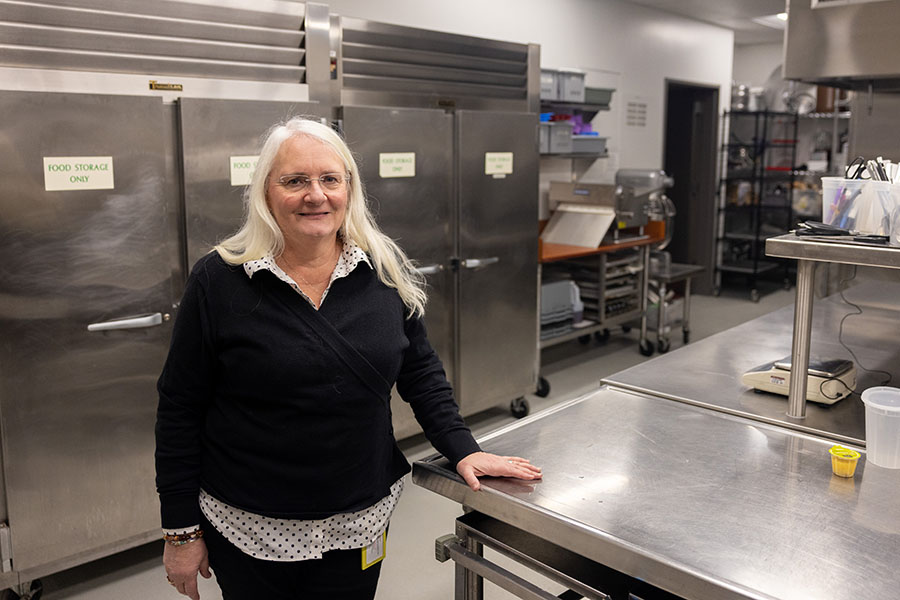Sarah Masoni has been quietly shaping Oregon’s food scene for more than 20 years.
Sarah Masoni grew up in Minnesota, but her heart has always been in Oregon.
Her father grew up in Grants Pass but moved to Minnesota to get his Ph.D. in food science. In summers, though, the family — Masoni’s parents and their four children — would travel to Oregon for vacation.
“I remember climbing over the backseat of the yellow Dodge station wagon, saying to myself, ‘When I grow up, I’m moving to Oregon,’” Masoni tells Oregon Business.
If you’ve read an article about Oregon’s food industry in recent years, chances are you’ve seen Masoni’s name in print. Sometimes she’s there as a quoted subject, offering insight about a particular product or sector. Sometimes the primary subject of the story mentions Masoni, or someone at the Food Innovation Center — where she has worked for 23 years — is quoted as crediting her for playing a pivotal role in developing a recipe.
But those appearances, however frequent, are usually cameos rather than starring roles. Masoni herself is rarely the center of attention, save a 2018 New York Times profile and a CBS News segment, both of which described her as having a “million-dollar palate.” (On a recent episode of her podcast, “Meaningful Marketplace” — which she says has 6 million listeners — Masoni deadpans that she should get her palate insured, a nod to the story of Hollywood legend Betty Grable getting her legs insured for $1 million.)
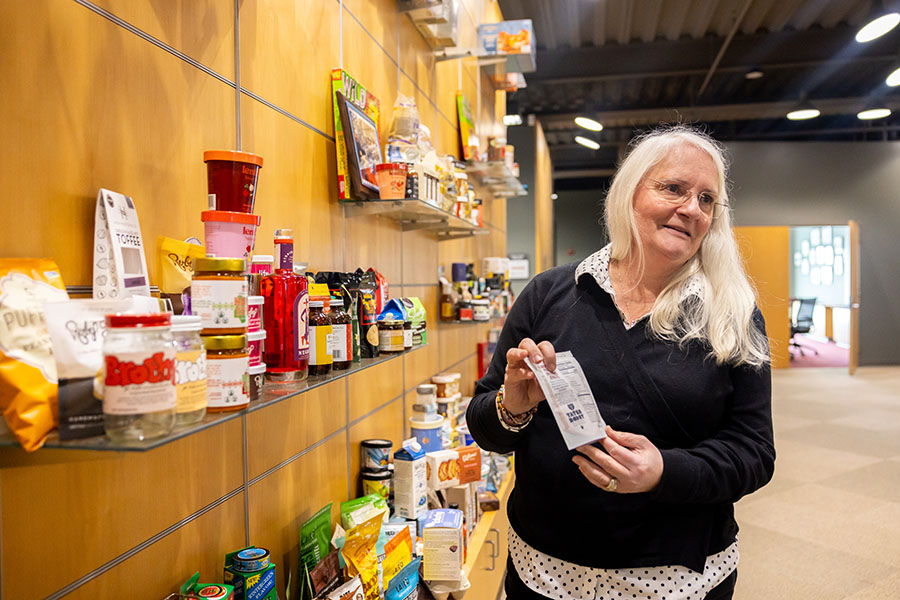
Masoni is the process and product development director and a senior faculty researcher at Oregon State University’s Food Innovation Center, which opened in 1999. The center receives funding from the university and from grants; entrepreneurs can also pay $140 an hour to meet with Masoni and get her advice. She’s helped usher a staggering number of Oregon food startups to either become beloved local favorites or to national distribution and prominence: Ruby Jewel’s ice cream sandwiches, Choi’s kimchi and several Bob’s Red Mill products.
“The thing that I love about Sarah is she gives unrequested feedback to every food business,” says Sarah Marshall, co-owner of Marshall’s Haute Sauce, a line of hot sauces that can be found at New Seasons, Zupan’s and Northwest gift shops like MadeHere and Tender Loving Empire. “And she’s never wrong. She’s telling you something that is very true. She says it like it is.”
Marshall is a former social worker who started making hot sauce on the side and decided to look into starting a business when she realized she was burning out at her day job. When she met with Masoni in 2010, Masoni tasted her sauces and said that while they tasted great, they didn’t look good enough to sell.
“Within the first, like, minute of me meeting her and her tasting my sauces, she’s like, ‘It’s kind of brown. Nobody wants to buy brown sauce.’”
So Marshall took Masoni’s feedback and altered the sauce’s formula: She’d been using a combination of green and red peppers to make the sauce, but on Masoni’s advice, she separated them into two recipes.
Masoni’s ability to quickly size up what is and isn’t working with a product — and to deliver feedback that,however blunt, never seems to come across as hostile or snotty — is one reason she’s so sought after. There’s also that “million-dollar palate”: She has great taste. And she has a marketer’s sense of how to present and package a product so it will sell.
And then there’s this. Masoni knows a lot about food — how different crops are grown in different parts of the country and how different food products are made.
Since their initial meeting, Masoni and Marshall have become friends, getting together at the Emerald Line near the FIC, or traveling to trade shows together.
Marshall is also the co-host of “Meaningful Marketplace”; together she and Masoni interview a different food entrepreneur each week. Recent guests have included Jana Jenkins, the founder of Oregon Ag and Oregon Wild Rice; Andrea Ludlow of Showstopper Cookies; and James Barry, whose business, Pluck, makes food seasoning out of a combination of spices and freeze-dried organ meats.
Conversations can get a bit into the weeds, sometimes literally. During her conversation with Jenkins, Masoni describes the way wild rice is harvested in Minnesota, using canoes and rice sticks — which are like enormous chopsticks rice harvesters use to bend rice stalks and sweep the stems into the boat.
“My dad was a food scientist, so I tell people I got my food-science training at the kitchen table,” Masoni says. Her father, Edmund Zottola, was an extension agent with the University of Minnesota and later a professor of food microbiology at Minnesota’s department of food science and nutrition. He’d invite her to go with him on work trips to small communities to do presentations on cheese, his area of expertise.
“I’d be sitting at the back next to the slide projector. I’m sure I was like, ‘Ughhh,’ you know,” she says, letting out a mock groan. “But I was sitting there listening to my dad talk about dairy products and entrepreneurship, essentially. I think I have a unique background in that because of my childhood experiences.”
Masoni kept her childhood promise to herself and moved to Oregon for college. Her father got his bachelor’s degree in food science from Oregon State, and she started out with the same declared major.
But then she took a drawing class and changed her mind — but not all the way.
“I switched my degree to a bachelor of science in art with a minor in food science, which gives me the creativity of an artist along with the knowledge of a scientist,” Masoni says. “So I’m able to talk with just about anyone about anything. If I need to go on my creative road, I do that. If I need to go on my science road, I do that.”
After college, Masoni worked as a technical sales manager for Columbia Laboratories, a food-testing laboratory, and in product development for Gardenburger during the 1990s. Gardenburger was founded in Gresham in the early 1980s and was, when Masoni started, still completely based in Oregon — but by the end of the ’90s had started to move operations to Utah. Masoni divided her time between the two states, but eventually her job was cut and she found herself on the job market.
That was in 2000. OSU’s Food Innovation Center had just opened a few months before. Masoni had “the fastest job interview of my life,” and was hired shortly after.
“It was an interesting time here in Oregon,” Masoni says. “We were at a place where we realized that we were creating great products in our fields and processing them as ingredients. But the Department of Agriculture and Oregon State University leaders decided it would be great if we had a facility in the city that focused on creating value-added food products.”
As Masoni describes it, her role wasn’t well defined at first. So she cut a path for herself.
“After a while of sitting here and waiting for someone to tell me what to do, I realized, ‘Oh, maybe I need to figure out what to do,’” she says dryly. “So I started working with startup food companies.”
The FIC is under OSU’s umbrella but also receives funding from organizations like Bob’s Red Mill and the Wheat Marketing Center for its product development labs. And clients pay an hourly fee to meet with her, but she tries to make sure they get as much for that money as possible.
“Sometimes I just meet with somebody one time. If their product is pretty straightforward, I’ll just tell them exactly what they need to do,” Masoni says. Sometimes that’s plenty: She says she’s had entrepreneurs approach her at meetings who tell her just one meeting helped them solve the problems they needed to solve to build a successful business.
Sometimes more work is needed. When we spoke in November, Masoni estimated that the FIC had about 20 entrepreneurial clients actively working on product development in its labs in Northwest Portland.
“You need to have a food that tastes good, it needs to look good, it needs to be safe to go on to the shelf. And it needs to be reproducible. People need to be able to make it over and over and over again so it tastes great every single time,” Masoni says.
She’s been on the job long enough now to be working with a second generation of farmers, sometimes the children of people she worked with when she started. The vast majority of Masoni’s clients are people who bring family recipes to them — for cranberry sauces, for hot sauces, for cookies — hoping to find a way to bring them to market.
Others just come with an idea for making a product differently.
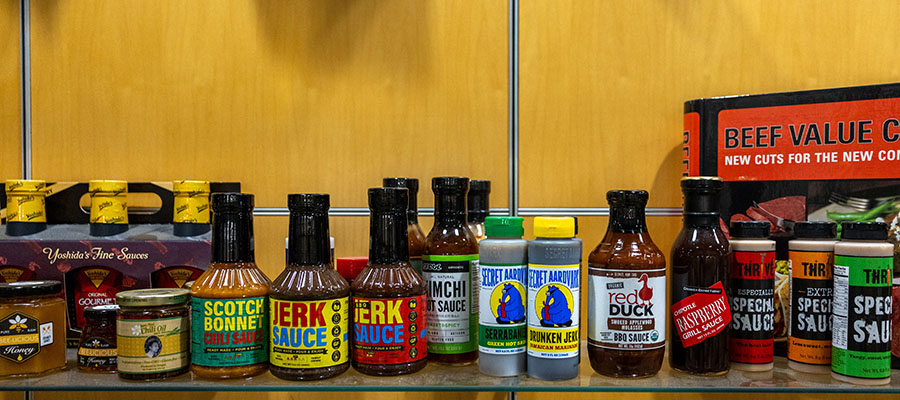
One of the Portland food scene’s most celebrated success stories is that of Salt & Straw, which started as a Southeast Portland food cart and has scaled up to 40 retail locations across the country. As this issue of OB went into production, the company announced a partnership with Taco Bell to revive the Choco Taco, the much-mourned frozen treat once made by Klondike but discontinued in 2023.
Originally conceived as a “farm to cone” ice cream company — though co-founder Tyler Malek says they’ve largely retired the phrase — Salt & Straw is known for its surprising flavor combinations, which incorporate savory ingredients for surprising results. Malek dropped out of culinary school to develop the company with his cousin Kim. And he confirms that some of the shop’s signature flavors — like strawberry balsamic, and pear and blue cheese — were developed by or with Masoni.
“My husband of many years had brought home a bag of blue cheese crumbles from Sunshine Dairy. They were huge, so I’d stick it in the freezer. And I’d be cooking dinner and I’d just grab a few pieces of frozen blue cheese and eat them because they don’t really ever freeze,” Masoni says. “When I was talking with Kim, we were brainstorming, and I was like, ‘I have this idea for a pear and blue cheese ice cream.’”
Masoni whipped up a batch for the Maleks; for the first few months it was open, the FIC also served as Salt & Straw’s manufacturing site.
“I was driving over every night, making it in the morning, driving over at night, scooping, and then over and over again,” Malek says. “As we were kind of creating flavors through our first summer, Sarah’s office was a few rows down. I’d go knock on her door [and say], ‘This thing isn’t freezing right. What am I doing?’”
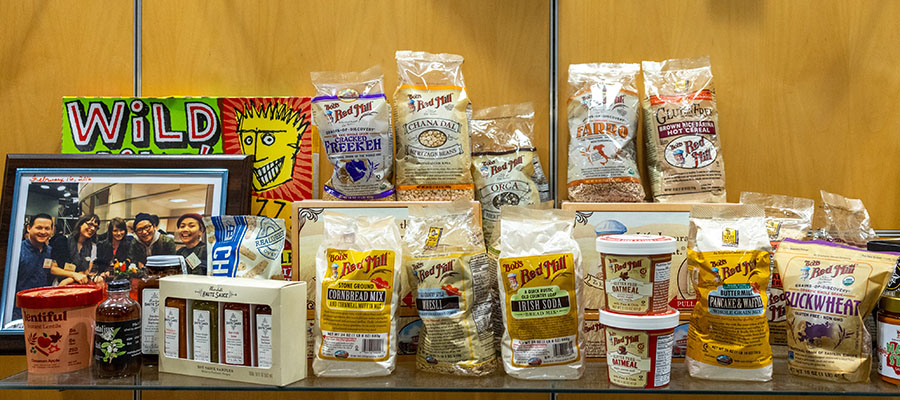
John Boyle, merchandising manager for Market of Choice, tells OB he’s also sent vendors to the FIC if he thinks they’re onto something but their products need a little fine tuning. Masoni also introduces vendors to Boyle if she thinks they have something he might want to put on the shelf.
Chris Spencer, founder and CEO of Keto Pint — a high-protein, no-sugar-added ice cream — says Masoni was instrumental in both teaching him how to make ice cream and how to create a formula that would meet the nutritional goals that he was shooting for, and would also taste good enough to sell. And then she introduced him to Boyle, making Market of Choice the first store to put Keto Pints on the shelves. (Spencer also coined the phrase “million-dollar palate” in reference to Masoni.)
Malek and Boyle are quick to point out that few places have a resource like the FIC: “This is like high level R&D,” Malek says. “This is knowledge that typically is only afforded to billion-dollar-plus companies.”
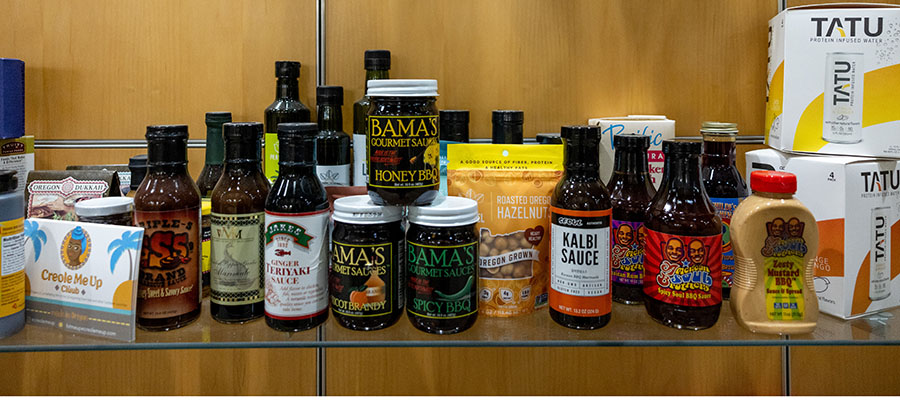
“Oregon has an incredibly, incredibly vibrant local food system. We’re super fortunate to have people like Sarah and the different incubators and groups that are out there helping,” Boyle says. “I’ve worked across the country and never seen it anywhere else, where you have makers helping makers, and retailers helping retailers and introducing people. There are so many barriers that exist for entrepreneurs, but to know that, in Oregon, specifically based on my experience, there are all these systems working in harmony and people who have their back: It’s just something that doesn’t exist anywhere else.”
Many of Masoni’s success stories involve ice cream, and that’s not an accident. It’s been her favorite thing since she was a child visiting her family’s dairy in Grants Pass, grabbing ice cream sandwiches and Fudgesicles out of the freezer.
“Those were the two things my mouth liked,” Masoni says, laughing.
She’s also always cooking at home.
“I really look at food as my art, because that’s my training,” Masoni says. “I look at color, flavor, texture. It’s like mixed media. You need a little crunchy, salty, a little acid. All those things that you hear chefs talk about are the same things that I look for in a food product — and that I try and do in my own kitchen.”
While Masoni is frequently described as kind and disarming, and while her sense of humor occasionally tends toward self-deprecation, she knows what she’s done for Oregon’s food community; she doesn’t feign modesty.
“It’s hard for me to talk about myself, but when somebody asks me, I like to talk about myself, you know what I mean?” she says. “It’s fun to kind of think through all the things you’ve done — and it’s real. It’s not made up. Like, don’t gaslight me. Don’t gaslight me for the work I’ve done. It’s been from my heart and it’s been a commitment to the whole community.”
Click here to subscribe to Oregon Business.

